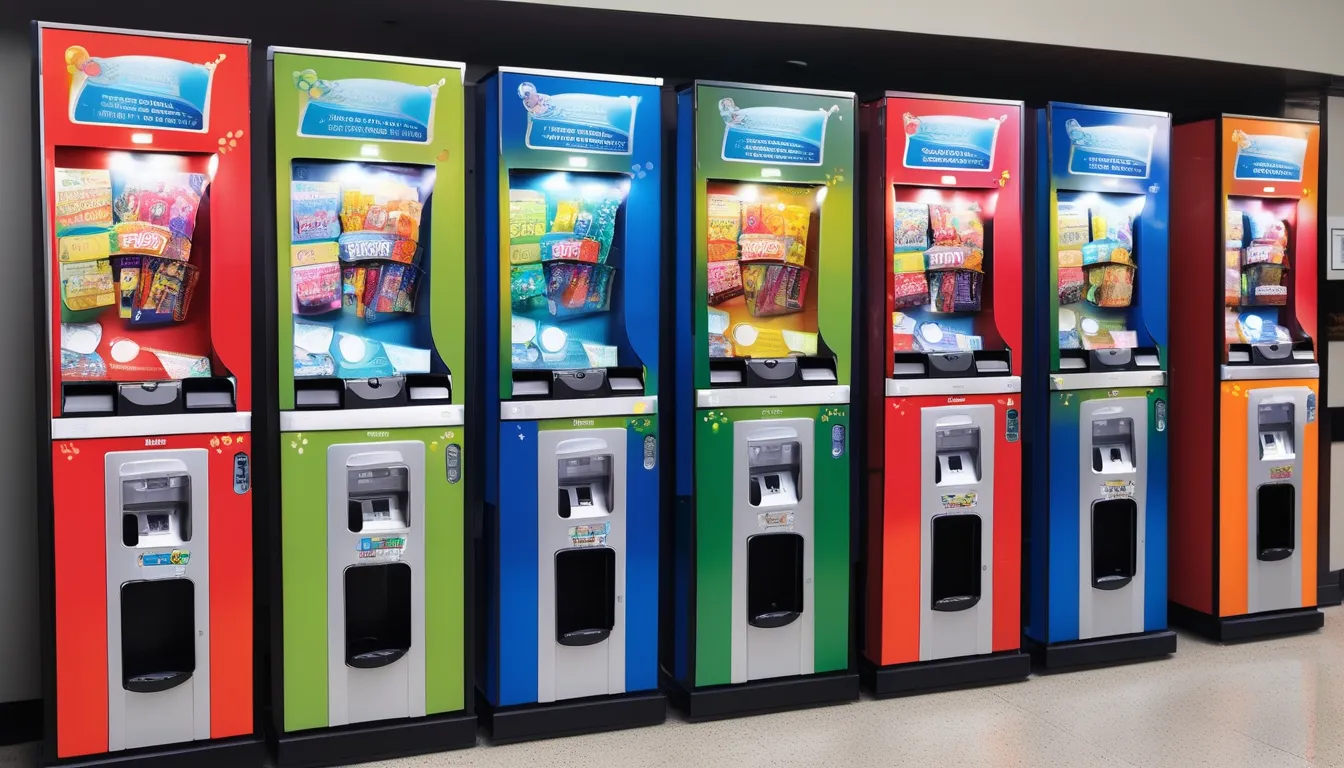Investing in trading card vending machines can be a strategic choice for your business, particularly when considering tax implications. The potential for tax savings through deductions and incentives is a compelling reason to explore this avenue further. With careful planning and adherence to tax regulations, vending machine owners can navigate the complexities of tax benefits and optimize their financial position. Stay tuned to discover the key tax advantages associated with trading card vending machines and how they can benefit your bottom line.
Tax Benefits of Trading Card Vending Machines
If you're considering investing in trading card vending machines, you'll be pleased to know that they come with several tax benefits. These machines offer opportunities for tax deductions and incentives that can positively impact your overall financial situation.
By investing in trading card vending machines, you can potentially take advantage of tax credits for small business investments, which can lead to significant savings on your tax bill. Additionally, the depreciation of the vending machines over time can be used to offset taxable income, reducing the amount you owe in taxes each year.
Furthermore, if you operate your vending machine business as a pass-through entity, such as a sole proprietorship or a partnership, you may be eligible for further tax benefits. It's essential to keep detailed records of your vending machine business expenses and consult with a tax professional to ensure you're maximizing all available tax benefits.
Deductions for Vending Machine Investments
When considering deductions for vending machine investments, it's crucial to understand the potential tax benefits available to you. Investing in trading card vending machines can offer various deductions that may help reduce your taxable income.
One significant deduction you may be eligible for is the Section 179 deduction, which allows you to deduct the full purchase price of qualifying equipment, such as vending machines, up to a certain limit.
Additionally, you can benefit from depreciation deductions on your vending machine investments. By depreciating the cost of the vending machines over their useful life, you can deduct a portion of the machine's cost each year, lowering your taxable income.
Moreover, expenses related to maintaining and servicing your vending machines, such as repairs, supplies, and even insurance premiums, can also be deductible. Keeping detailed records of these expenses is essential to ensure you claim all eligible deductions.
Understanding and utilizing these deductions can significantly impact your tax savings, making trading card vending machines a smart investment choice for potential tax benefits.
Strategies for Maximizing Tax Savings
To maximize tax savings when investing in trading card vending machines, focus on strategic planning and proactive tax management. Start by keeping detailed records of all expenses related to your vending machine business, including purchase costs, maintenance fees, and any other expenses incurred. By maintaining accurate records, you can ensure that you're maximizing your deductions when tax season rolls around.
Additionally, consider consulting with a tax professional who's experience with vending machine businesses. They can provide valuable insights and help you navigate the complex world of tax deductions and credits.
Another strategy for maximizing tax savings is to stay informed about changes in tax laws that may impact your vending machine business. By staying up-to-date on tax regulations, you can take advantage of any new deductions or credits that may be available to you.
Potential Tax Credits for Machine Upgrades
Occasionally, tax credits can be available to vending machine owners who invest in upgrades for their machines. These tax credits are designed to incentivize improvements that contribute to energy efficiency, accessibility, or other specified criteria. By upgrading your trading card vending machines with energy-efficient components or making them more accessible to individuals with disabilities, you may qualify for these tax credits.
Energy-efficient upgrades such as LED lighting, motion sensors, or smart technology can't only save you money on energy bills but also make you eligible for tax credits.
Similarly, making your vending machines more accessible by installing features like Braille instructions, lower button placements, or auditory cues could make you eligible for additional tax benefits.
Before making any upgrades, it's crucial to research the specific requirements for qualifying for these tax credits. Keeping detailed records of the upgrades made and expenses incurred will be essential when claiming these credits. Consult with a tax professional to ensure you're maximizing your tax benefits while improving your trading card vending machines.
Compliance Tips for Vending Machine Owners
Amidst the regulations and requirements that govern vending machine operations, ensuring compliance is essential for vending machine owners. To help you navigate the complexities of staying compliant, here are some key tips to keep in mind:
Compliance Tips for Vending Machine Owners
|
Tip |
Description |
Action |
|---|---|---|
|
Regular Inspections |
Conduct routine inspections to ensure machines are in proper working order and meet all safety standards. |
Schedule monthly check-ups for each vending machine. |
|
Product Labeling |
Clearly label all products with pricing, expiration dates, and nutritional information where applicable. |
Regularly check and update product labels as needed. |
|
Cash Handling Procedures |
Implement secure cash-handling protocols to prevent theft and ensure accurate revenue tracking. |
Train employees on proper cash-handling procedures. |
|
ADA Compliance |
Ensure your machines are ADA compliant, providing accessible features for individuals with disabilities. |
Conduct ADA compliance assessments annually. |
|
Tax Reporting |
Keep detailed records of sales and report income accurately to comply with tax regulations. |
Hire a tax professional to assist with accurate reporting. |
Frequently Asked Questions
Can Vending Machine Expenses Be Split Among Multiple Tax Categories?
Yes, vending machine expenses can be split among multiple tax categories. It allows for better allocation of costs and maximizes tax benefits. You should consult with a tax professional to ensure accurate categorization.
Are Vending Machine Maintenance Costs Tax-Deductible?
Yes, vending machine maintenance costs are usually tax-deductible. Regular maintenance expenses, such as repairs and servicing, can be claimed as business expenses on your トレカ 自販機 es. Just keep track of your receipts for accurate deductions.
Can Vending Machine Losses Be Carried Over to Future Years?
Yes, vending machine losses can typically be carried over to future years for tax purposes. This allows you to offset profits in future years and potentially reduce your overall tax liability over time.
Are There Tax Incentives for Locating Vending Machines in Specific Areas?
You can benefit from tax incentives by placing vending machines in designated areas. These incentives can help you save on taxes and boost your business. Consider exploring strategic locations to maximize these savings opportunities.
How Does Depreciation Impact Tax Savings for Vending Machine Owners?
Depreciation reduces taxable income, increasing tax savings for vending machine owners. By spreading the machine's cost over its useful life, you can claim annual depreciation deductions, lowering your tax liability. Consult a tax professional for specifics.
Conclusion
In conclusion, investing in trading card vending machines can offer significant tax benefits and savings for business owners. By taking advantage of deductions, depreciation, and potential tax credits, you can maximize your financial strategy and reduce taxable income. Make sure to keep detailed records, consult with tax professionals, and stay informed about tax laws to optimize your tax savings. With the right approach, trading card vending machines can be a smart move for your bottom line.




